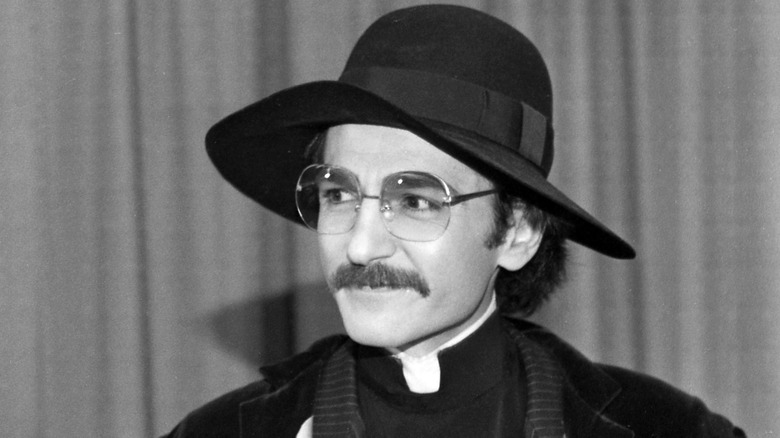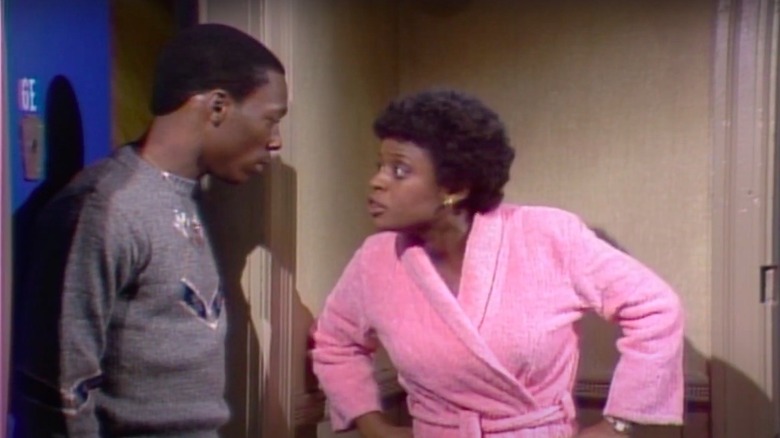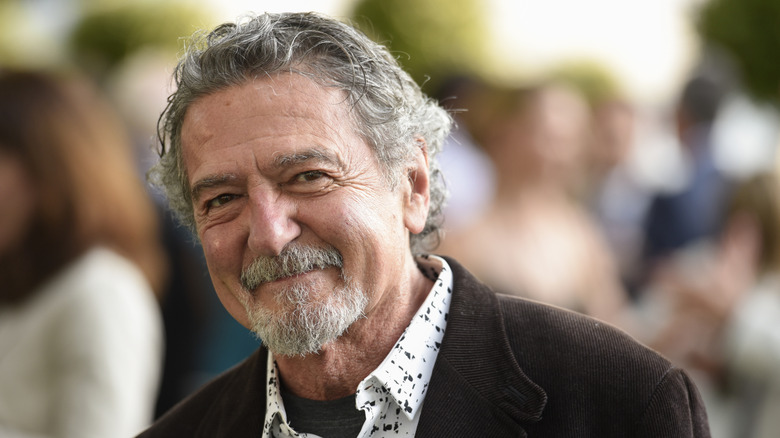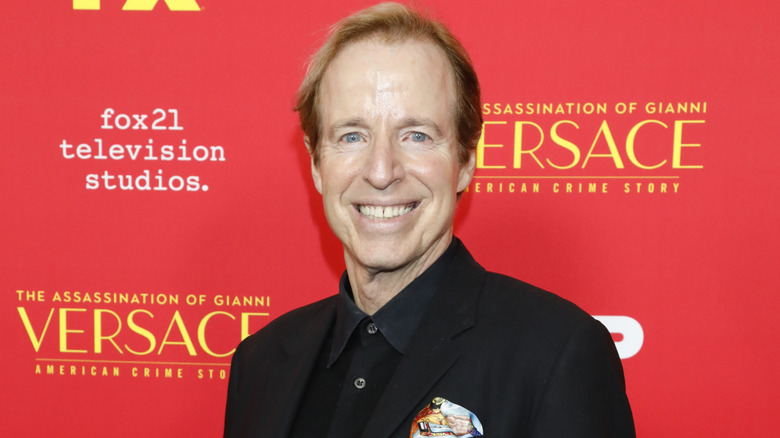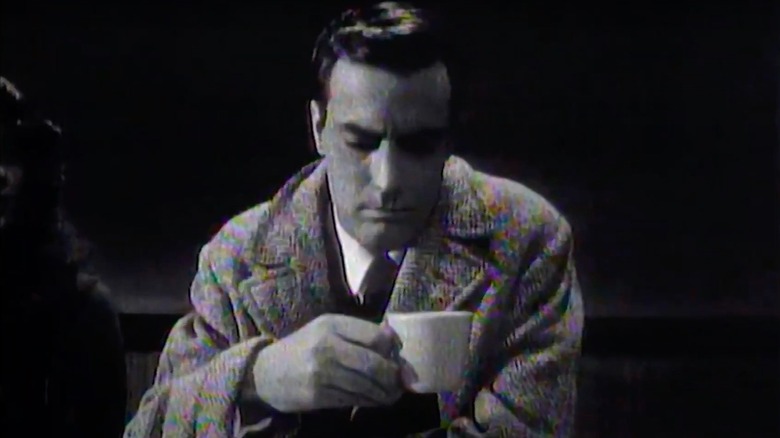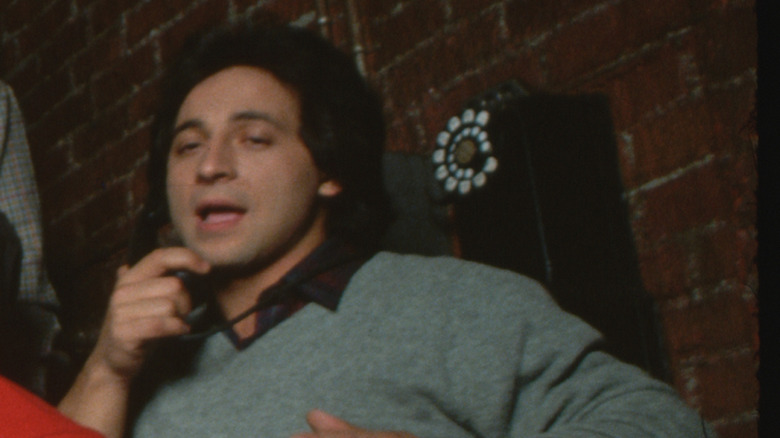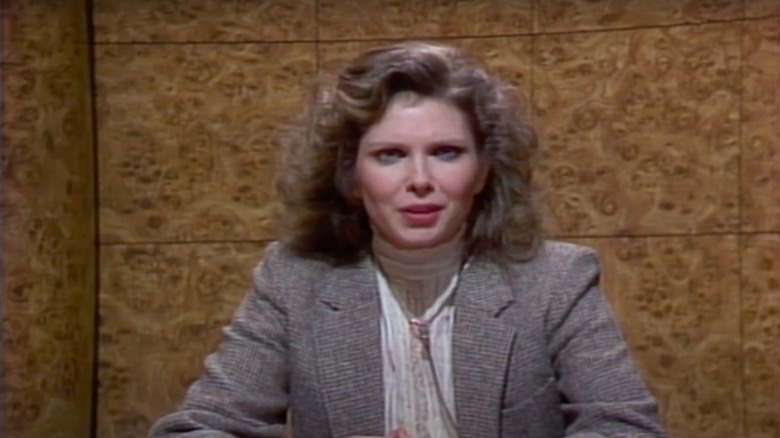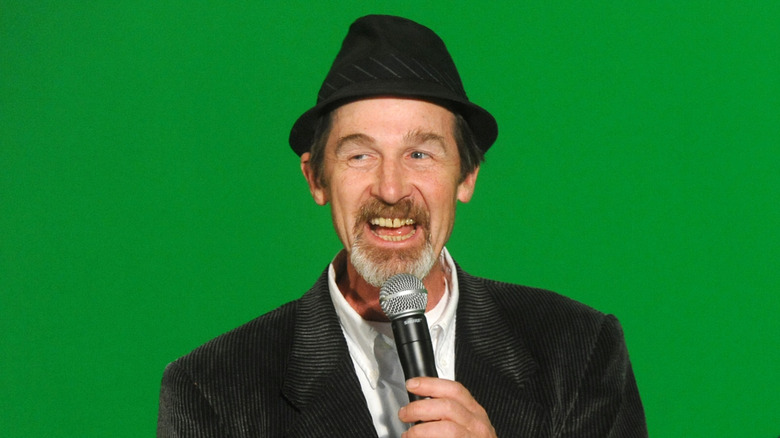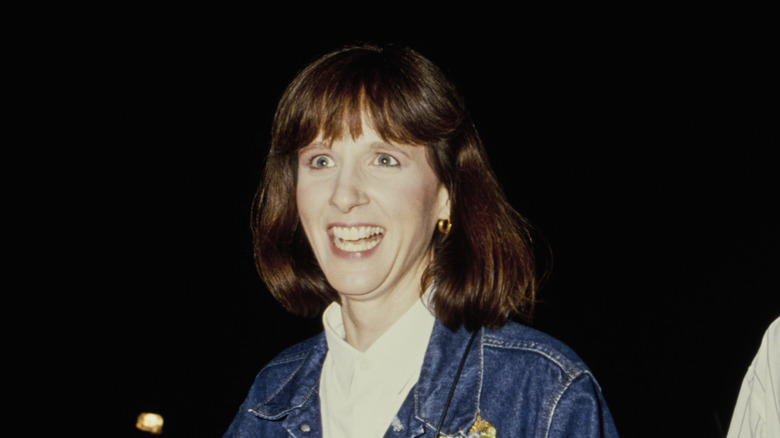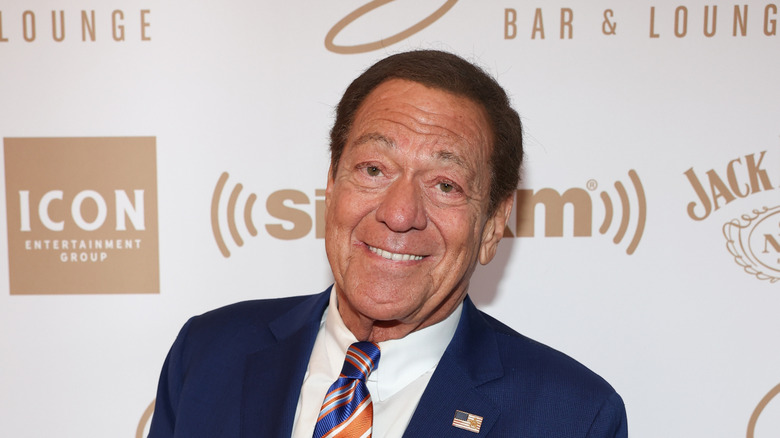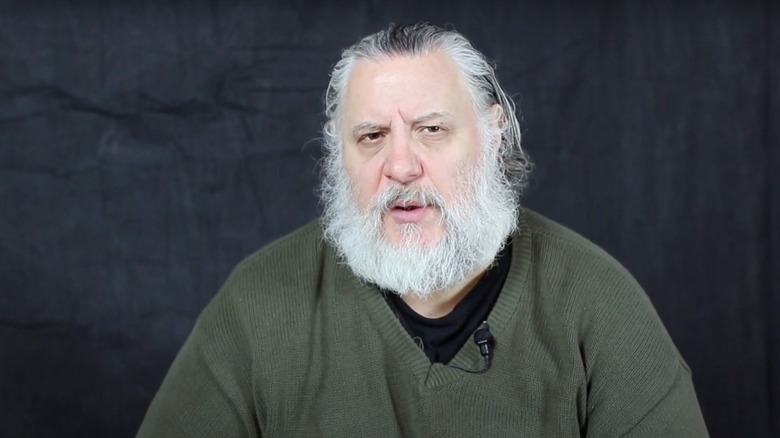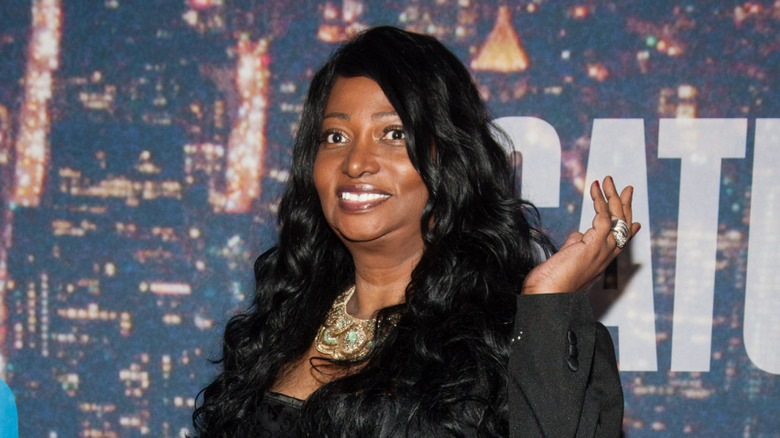SNL Stars Who Disappeared
We may receive a commission on purchases made from links.
It's no secret that "Saturday Night Live" has generated plenty of controversy over the years, yet it's also fair to state that no TV show in history has launched more stars. In the show's half-century on television, a staggering number of cast members have gone on to Hollywood superstardom. That lengthy list includes the likes of Bill Murray, Eddie Murphy, Tina Fey, Will Ferrell, Mike Myers, Kristin Wiig, and Adam Sandler. Heck, even Iron Man himself, Robert Downey Jr. — even if he was unceremoniously fired – can list "SNL" on his résumé.
Of course, "SNL" hasn't been a pathway to fame and fortune for everyone. In fact, the vast majority of former cast members have experienced more modest showbiz careers. There is, however, another category: those who have seemingly vanished altogether, once appearing on television alongside future comedy legends but then fading into obscurity once their time in the "SNL" spotlight came to an end.
So what happened to them? What circumstances led the careers of these actors, who'd demonstrated enough talent to land a coveted spot in the cast, to evaporate? Those reasons are as fascinating as they are varied, so here's a look at some "SNL" stars who disappeared.
Yvonne Hudson
Yvonne Hudson is hardly a household name, but she does hold a rare honor in "Saturday Night Live" history as the show's first-ever Black female cast member. During the roundly despised 1980-'81 season, which was producer Jean Doumanian's brief and tumultuous time leading the show, Hudson appeared in the opening credits. However, her association with the show actually extended back to the show's early years. All told, she appeared in 31 episodes, alongside such "SNL" legends as Gilda Radner and Eddie Murphy, making her debut in the third season, and marking her final appearance in the 10th. After that, Hudson took on a behind-the-scenes role as a production assistant for "Motown Returns to the Apollo," a TV special that aired in 1985. And then Hudson pretty much disappeared from public view.
Interestingly, former "SNL" cast member Patrick Weathers (who had a brief 10-episode tenure on the show during the 1980-'81 season) shared some intel about how Hudson came to be a part of the cast. "And they had made Yvonne Hudson, she was a former receptionist, they had made her a featured player. But she was really like an extra," he recalled when interviewed by HuffPost in 2017, revealing how Hudson's behind-the-scenes role led her to be placed in sketches requiring a Black woman. "Yeah, they just kind of gave her a title," Weathers added. "A link maybe to the original cast."
Don Novello
Initially hired as a writer on "Saturday Night Live," Don Novello carved out an on-camera presence during "Weekend Update" as Father Guido Sarducci, a chain-smoking priest who served as a gossip columnist for the Vatican newspaper. Making his first appearance in the third season, the character continued to appear, albeit sporadically, over the next two decades. According to Novello, Sarducci was inspired by a Jesuit priest from Malta who smoked like a chimney. "And I kind of copied that after him," he revealed during a 2021 appearance on "The Wiseguyz Show."
Novello became so closely associated with the character that he played Sarducci in dozens of other TV shows, a lengthy and eclectic list that ranges from wholesome sitcom "Blossom" to crass comedy "Married ... with Children" and the critically acclaimed miniseries "Armistead Maupin's Tales of the City." Novello portrayed his most famous creation as recently as 2015, in the short film "Become an Artist.
Novello actually created another enduring character who appeared only in books and never onscreen: Lazlo Toth. Using that pen name (borrowed from a man with mental health issues who smashed one of Michelangelo's statues with a hammer in 1972), Novello wrote wacky letters to an array of politicians and celebrities, publishing his queries and the responses he received in "The Lazlo Letters," which was followed by "Citizen Lazlo!: The Lazlo Letters, Volume 2" in 1992. Novello, who turned 80 in 2023, has remained out of the public eye in recent years.
Terry Sweeney
Terry Sweeney holds a distinctive place in "Saturday Night Live" lore. When he joined the cast in 1985, he was the first-ever openly gay member of the cast. His time with the show was brief at just one season, but he made an impression on viewers via his impression of Nancy Reagan in numerous sketches. Following his exit from the show, he guest-starred in a few sitcoms (including "Seinfeld" and "Family Matters"), and spent a few years as a writer on Fox sketch-comedy series "Mad TV" from 1997 until 2000.
While Sweeney may have been an "SNL" pioneer, his status as a gay actor hindered his career. Frustrated with his lack of acting work, in the mid-2000s he left Hollywood and moved to Beaufort, South Carolina. He shared his Hollywood journey in his 2016 memoir, "Irritable Bowels and The People Who Give You Them."
In 2018, Sweeney made a comeback when he was cast in "The Assassination of Gianni Versace: American Crime Story," and the following year in "The Politician." The connecting thread between both those shows is Hollywood uber-producer Ryan Murphy — who, like Sweeney, is openly gay. As Sweeney told TV Guide, Murphy had once interviewed him as a young journalist. "I could tell he was a young kid and we had a great interview and he wrote a lovely article about me," Sweeney recalled. "Who would dream years later someone that works for him would find me and hire me for this part?"
Peter Aykroyd
Peter Aykroyd was arguably the first "legacy hire" made in the cast of "Saturday Night Live." The younger brother of original "Not Ready for Prime Time Player" Dan Aykroyd, he was brought in as a writer and featured player during the 1979-'80 season. Unlike his sibling, the younger Aykroyd didn't make much of an impression during his single season on the show; his most memorable turn was as a coffee-addicted diner customer in a short film noir parody titled "Java Junkie." He did, however, receive an Emmy nomination for his stint on the show.
Aykroyd went on to maintain a longstanding working relationship with his big brother Peter in various projects, including contributing to the screenplay of the 1991 movie "Nothing But Trouble," and co-creating the elder Aykroyd's TV series "PSI Factor: Chronicles of the Paranormal." In addition to writing and acting, he was also a musician, and contributed to the soundtracks of several of his brother's films; working out of a studio in his basement, he was also employed for a time as a recording engineer.
When he died in 2021, he was living in Spokane, Washington, where he was working with a naturopathic healthcare company utilizing ozone gas to heal a multitude of ailments. As his brother told Canada's Globe and Mail, he died when an infection went septic after he attempted to cure it on his own. "In the end, he just thought he could fix himself," said Dan Aykroyd.
Tony Rosato
Before coming to "Saturday Night Live" in the 1980-'81 season, Tony Rosato was already a veteran of beloved Canadian sketch-comedy series "SCTV." After just one season in the "SNL" cast, he was cast in "Amanda's," an ABC sitcom based on iconic British comedy "Fawlty Towers." The show was canceled after 13 episodes, and Rosato returned to his native Toronto, where he became a series regular on Canadian cop show "Night Heat." He gravitated toward voice acting in animated TV series, ranging from plumber Luigi in "Super Mario World" to providing various voices for "The Busy World of Richard Scarry."
His career came to a screeching halt in 2005, when Rosato was arrested and charged with harassing his wife. After spending two years in jail, in 2007 he was put on trial and found guilty; Rosato was not convicted, but was instead committed to a psychiatric facility after a diagnosis of Capgras syndrome, a rare disorder that led him to believe his family had been replaced by identical imposters. As CBC News reported, Rosato proclaimed his innocence and insisted he was fine; his own lawyer, however, begged to differ. "Tony Rosato belongs to a group of individuals who suffer from a disorder that is quite treatable," attorney Daniel Brodsky said.
That treatment was ultimately successful, and Rosato was released in 2009. He resumed his acting career and continued working until his death in 2017 at the age of 62, reportedly of a suspected heart attack.
If you or someone you know needs help with mental health, please contact the Crisis Text Line by texting HOME to 741741, call the National Alliance on Mental Illness helpline at 1-800-950-NAMI (6264), or visit the National Institute of Mental Health website.
Ann Risley
Ann Risley's tenure with "Saturday Night Live" lasted just one season in 1980-'81, following the departure of the original cast and producer Lorne Michaels. According to Doug Hill's 1986 book, "Saturday Night: A Backstage History of Saturday Night Live," Risley's imperious attitude — she reportedly boasted about being in some Woody Allen movies and having performed Shakespeare — didn't prove endearing to her co-stars; after she once asked Eddie Murphy to fetch her some juice (he did not), he took pleasure in mocking her at every available opportunity. When Michaels' replacement for that catastrophic season, Jean Doumanian, was sent packing and NBC exec Dick Ebersol took over as "SNL" producer, Risley was one of the first to be shown the door.
After "SNL," she headed to Broadway and featured in the acclaimed play "Come Back to the Five & Dime, Jimmy Dean, Jimmy Dean" from 1982 until 1983. She went on to appear in a few TV series and movies, but her final screen credit was way back in 1993, playing a nun in TV-movie "Jericho Fever.
"I moved from New York City to Tucson in 1984 to create and open a professional acting studio in the Southwest — and for 18 years, it's been a one-of-a-kind situation," Risley, going by Anna Risley, wrote on the website of her acting school, The Studio for Actors, in 2018. Risley is now apparently retired; according to Yelp, The Studio for Actors has since closed down.
A. Whitney Brown
A. Whitney Brown was hired as a writer for "Saturday Night Live" in 1985, and stuck around until 1991. He also appeared onscreen, typically in small roles (say, a waiter or a gambler in a casino), but gained a certain degree of fame when he appeared as himself for his "Big Picture" segments during "Weekend Update." He cashed in on those appearances with the 1991 publication of his book, "The Big Picture," a compilation of all his on-air commentaries for "SNL." Brown's years on the show unfortunately coincided with an addiction to heroin; as he told The New York Times, he wasn't exactly the greatest influence on doomed co-star Chris Farley, with whom he shared an office — and who experienced his first taste of heroin from Brown's dealer. Having long since kicked heroin, Brown joked that sobriety had led him to become "more honest and even more punctual. Also, I don't throw up as much."
Brown's career since then has primarily been as a writer. Post-"SNL" gigs included Comedy Central sketch series "Exit 57," and "The Daily Show" (during the pre-Jon Stewart era, when Craig Kilborn was host), in which he appeared on-camera as he did on "SNL."
In 2011, Brown married singer-songwriter Carolyn Wonderland. The couple ultimately settled in Austin, Texas. "I work in the yard and she works doing her endless paperwork for the band — trying to get everybody paid," Brown said, describing a typical day when profiled by The Austin Chronicle.
If you or anyone you know needs help with addiction issues, help is available. Visit the Substance Abuse and Mental Health Services Administration website or contact SAMHSA's National Helpline at 1-800-662-HELP (4357).
Mary Gross
Mary Gross was hired for "Saturday Night Live" in 1981, and remained in the cast until 1985. During her tenure, Gross was known for her impression of Alfalfa from "The Little Rascals" and as the co-anchor of "Weekend Update." She apparently had mixed feelings about her years on the show; during a 1990s-era appearance on talk show "Goodnight America," Gross was asked if she had fun being on "SNL." "Fun is not always the first word that comes to mind, but it was educational," she said. "It was a graduate school in comedy, I think."
Gross — whose brother is "Family Ties"/"Tremors" star Michael Gross — went on to star in numerous films (most notably alongside Shelley Long in "Troop Beverly Hills") and various TV shows before ultimately pulling away from the spotlight. Her most recent screen credit was way back in 2012, a guest spot on TV sitcom "Raising Hope."
"I'm gonna say something that's probably not wise to say," Gross revealed during a 2024 interview with "Saturday Night Network," revealing why she stepped away from what had been a thriving showbiz career. "I don't know what the future's gonna bring, but some years ago I had to just stop my career because of back problems and chronic pain," she divulged. "I feel sad because I'm gonna show up on all these lists of, like, what became of her, you know. Like, 'she couldn't get arrested.'"
Joe Piscopo
Viewed as one of the brightest stars to emerge from "Saturday Night Live" in the early 1980s, Joe Piscopo frequently partnered with Eddie Murphy for some of the high points of that era. After exiting "SNL" in 1984, Piscopo headed to Hollywood, starring opposite Michael Keaton in "Johnny Dangerously" and sharing the billing with Danny DeVito in "Wise Guys." In 1988, he starred in cop comedy "Dead Heat," playing the partner of a police detective (Treat Williams) who became a zombie. The dismal reviews and limp box office pretty much slammed the door on his fledgling movie career. Meanwhile, Piscopo had bulked up significantly for "Dead Heat," hitting the gym for a bodybuilder's physique. He continued to pump iron after that, his buff bod showcased on the cover of Muscle & Fitness and other such magazines.
After that, Piscopo's projects ranged from TV guest spots to animation (he lent his voice to the 1990s "Pink Panther" series). He's also appeared in the "Law & Order" franchise an impressive four times, playing a different character in each episode.
In 2017, Donald Trump's ascension to the Oval Office led Piscopo to consider politics, and he mulled over running for governor of New Jersey. "I'm very serious about it," he told The New York Times of his gubernatorial ambitions. "I've never been more serious about anything in my life." He didn't run, and these days can be heard hosting "The Joe Piscopo Show" for New York's AM 970.
Dan Vitale
Even the most hardcore fans of "Saturday Night Live" shouldn't be embarrassed if Dan Vitale's name doesn't ring any bells. After all, Vitale was a featured player in just a handful of episodes between 1984 and 1985. Within months of joining the cast, what should have been his big break was interrupted. "I ended up going to rehab for months, because besides drinking I was doing incredible amounts of cocaine," Vitale recalled in a 2020 interview with Vulture, revealing he was fired shortly after his return. "When I came back, I didn't have much; maybe one line," he added. During that interview, Vitale set the record straight about a story told by comedian and former "Howard Stern Show" sidekick Artie Lange. "Artie's version is, I threw up on [singer Art] Garfunkel and the next day I got fired," Vitale said. "But I never threw up on him, and I was going to be fired anyway."
Looking back at his experience on "SNL," Vitale viewed the whole thing as something of a mixed bag. "It's a blessing and a curse," he said, admitting that stardom would have likely led him down a fatal path. "I am totally at peace with every success I did not have," he mused.
After "SNL," Vitale appeared in a few small roles in film and TV, while remaining a fixture on the New York City comedy scene. He died in 2022 at the age of 66.
If you or anyone you know needs help with addiction issues, help is available. Visit the Substance Abuse and Mental Health Services Administration website or contact SAMHSA's National Helpline at 1-800-662-HELP (4357).
Ellen Cleghorne
Hired for the 1991 season of "Saturday Night Live," Ellen Cleghorne distinguished herself with fan-favorite characters such as Queen Shenequa and NBC page Zoraida. She remained in the cast until 1995, but certainly didn't fade into obscurity after her exit; in fact, she left to take on a starring role in a TV sitcom that had been developed with her in mind, which was reflected in its title, "Cleghorne!" While the show only lasted a single season, she then appeared in numerous movies, including Ellen DeGeneres' "Mr. Wrong," box office hits "Coyote Ugly" and "Armageddon," and others.
In the early 2000s, Cleghorne made a surprising left turn into the world of academia, enrolling at New York University. She ultimately earned a master's degree and then a PhD in performance studies. She went on to teach, and in 2018 she'd recently completed a position at Graceland University, a small institution in Iowa.
Speaking with VH1 in 2017, Cleghorne revealed she was mulling a showbiz comeback and hoped to start performing standup comedy. "I really do want to do it," she said. "I want to do more of it all but it's a little bit scary." Meanwhile, the experience she'd gained had informed her approach to comedy. "Performance studies taught me to look at something and see one thing in everything," she told Slate. "That gives you an opportunity, as there's a never-ending amount of things you can write about, or write a sketch about."
